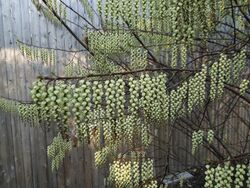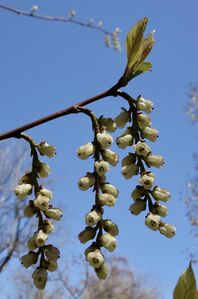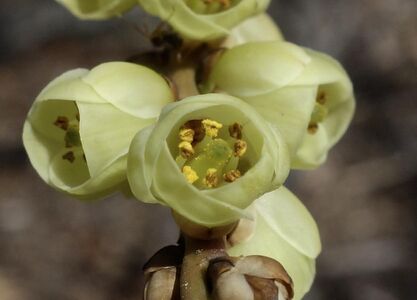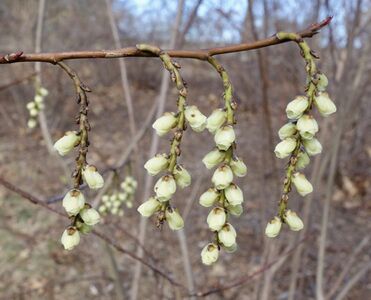Biology:Stachyurus praecox
| Stachyurus praecox | |
|---|---|

| |
| Brooklyn Botanic Garden, NY | |
| Scientific classification | |
| Kingdom: | Plantae |
| Clade: | Tracheophytes |
| Clade: | Angiosperms |
| Clade: | Eudicots |
| Clade: | Rosids |
| Order: | Crossosomatales |
| Family: | Stachyuraceae |
| Genus: | Stachyurus |
| Species: | S. praecox
|
| Binomial name | |
| Stachyurus praecox Siebold & Zucc.
| |
| Varieties | |
| |
Stachyurus praecox, early stachyurus, is a species of flowering plant in the family Stachyuraceae, native to Japan.[1] It is a spreading deciduous shrub growing to 4 m (13 ft) tall by 3 m (10 ft) wide. Pendent, bell-shaped, primrose yellow flowers are borne on naked arching branches in winter and spring.[2] They are followed by ovate leaves, which colour to pink or red before falling in autumn.[3]
The Latin specific epithet praecox means "early", referring to the exceptionally early flowering season.[4] It was first described in 1836 by Philipp Franz von Siebold and Joseph Gerhard Zuccarini.[5]
This plant is cultivated as an ornamental subject in temperate parks and gardens, though rarely seen.[3] It has gained the Royal Horticultural Society's Award of Garden Merit.[2][6]
Gallery
References
- ↑ "Stachyurus praecox". Royal Botanical Gardens Kew. http://powo.science.kew.org/taxon/urn:lsid:ipni.org:names:829504-1. Retrieved 2018-11-20.
- ↑ 2.0 2.1 "RHS Plant Selector - Stachyurus praecox". https://www.rhs.org.uk/Plants/17726/Stachyurus-praecox/Details. Retrieved 23 February 2020.
- ↑ 3.0 3.1 "Stachyurus praecox (early stachys)". Gardenia.net. https://www.gardenia.net/plant/Stachyurus-praecox-Early-Stachyurus. Retrieved 20 November 2018.
- ↑ Harrison, Lorraine (2012). RHS Latin for Gardeners. United Kingdom: Mitchell Beazley. ISBN 978-1845337315.
- ↑ "Stachyurus praecox". International Plant Names Index. https://beta.ipni.org/n/829504-1. Retrieved 2018-11-20.
- ↑ "AGM Plants - Ornamental". Royal Horticultural Society. November 2018. p. 101. https://www.rhs.org.uk/plants/pdfs/agm-lists/agm-ornamentals.pdf. Retrieved 18 February 2020.
External links
Wikidata ☰ Q17395498 entry
 |




